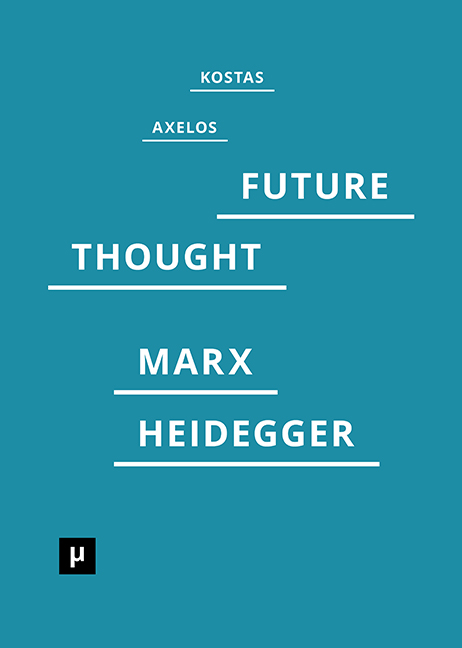Kostas Axelos: Introduction to a Future Way of Thought: On Marx and Heidegger (1966/2015)
Filed under book | Tags: · earth, labour, philosophy, philosophy of technology, production, technology

“‘Technologists only change the world in various ways in generalized indifference; the point is to think the world and interpret the changes in its unfathomability, to perceive and experience the difference binding being to the nothing.’
Anticipating the age of planetary technology Kostas Axelos, a Greek-French philosopher, approaches the technological question in this book, first published in 1966, by connecting the thought of Karl Marx and Martin Heidegger. Marx famously declared that philosophers had only interpreted the world, but the point was to change it. Heidegger on his part stressed that our modern malaise was due to the forgetting of being, for which he thought technological questions were central. Following from his study of Marx as a thinker of technology, and foreseeing debates about globalization, Axelos recognizes that technology now determines the world. Providing an introduction to some of his major themes, including the play of the world, Axelos asks if planetary technology requires a new, a future way of thought which in itself is planetary.”
First published as Einführung in ein künftiges Denken: Über Marx und Heidegger, Niemeyer, Tübingen, 1966.
Edited and with an Introduction by Stuart Elden
Translated by Kenneth Mills
Publisher meson press, Lüneburg, June 2015
Creative Commons BY-NC-ND 4.0 License
ISBN 9783957960061
178 pages
Review: George Tomlinson (Marx & Philosophy 2016).
Comment (1)Erich Hörl: The Technological Condition (2011/2015)
Filed under paper | Tags: · cybernetics, ecology, philosophy, philosophy of technology, subjectivity, technics, technology, work
Partial translation of the introduction to Die technologische Bedingung. Beiträge zur Beschreibung der technischen Welt, ed. Hörl (Suhrkamp 2011), a book “seeking to reformulate the (media)technical question under neocybernetic conditions at the beginning of twenty-first century. As such, it is part of a three-volume project. It follows Die Transformation des Humanen. Beiträge zur Kulturgeschichte der Kybernetik, eds. Michael Hagner and Erich Hörl (Suhrkamp 2008), and it will be followed soon by On General Ecology. The New Ecological Paradigm in the Neocybernetic Era, ed. Hörl.”
Translated by Anthony Enns
Published in Parrhesia 22, 2015, pp 1-15
Open access
More from Erich Hörl, and on philosophy of technology and media ecology.
Comment (0)Sylvia Berryman: The Mechanical Hypothesis in Ancient Greek Natural Philosophy (2009)
Filed under book | Tags: · antiquity, astronomy, automata, engineering, history of science, history of technology, machine, mechanics, philosophy, physics, science, technology

“It has long been thought that the ancient Greeks did not take mechanics seriously as part of the workings of nature, and that therefore their natural philosophy was both primitive and marginal. In this book Sylvia Berryman challenges that assumption, arguing that the idea that the world works ‘like a machine’ can be found in ancient Greek thought, predating the early modern philosophy with which it is most closely associated. Her discussion ranges over topics including balancing and equilibrium, lifting water, sphere-making and models of the heavens, and ancient Greek pneumatic theory, with detailed analysis of thinkers such as Aristotle, Archimedes, and Hero of Alexandria. Her book shows scholars of ancient Greek philosophy why it is necessary to pay attention to mechanics, and shows historians of science why the differences between ancient and modern reactions to mechanics are not as great as was generally thought.”
Publisher Cambridge University Press, 2009
ISBN 0521763762, 9780521763769
286 pages
Review (Serafina Cuomo, Aestimatio, 2012)
Review (Jean De Groot, Metascience, 2012)
Talk by the author (video, at UBC, 104 min, 2011)

